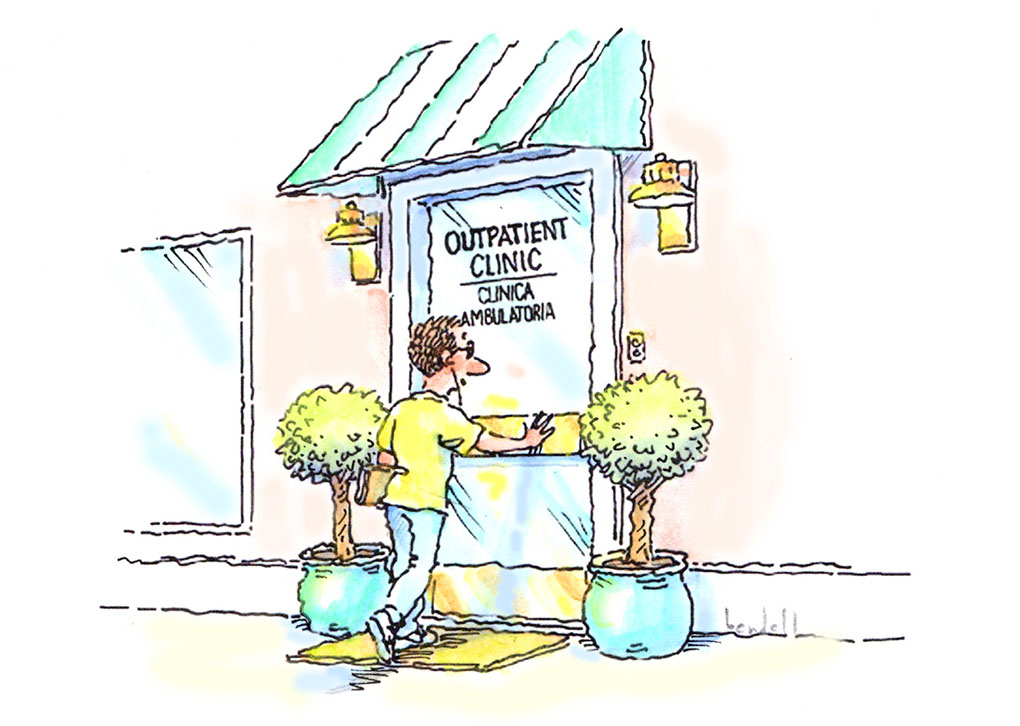Early Recovery Period
After you are well enough to be discharged to your home or temporary lodging near the transplant center, you will need to make frequent trips to the outpatient clinic for follow-up care.
 If you had a transplant using donor cells (allogeneic transplant), you will need to visit the outpatient clinic frequently for approximately 100 days after transplant.
If you had a transplant using donor cells (allogeneic transplant), you will need to visit the outpatient clinic frequently for approximately 100 days after transplant.
If you had a transplant using your own cells (autologous transplant), your follow-up at the outpatient clinic will be shorter.
During this period of time, your family caregiver will be an important part of your healthcare team. In addition to transporting you to the outpatient clinic, providing healthy meals, and assisting you with medical and routine tasks, your caregiver will need to carefully monitor you for signs of infection or other complications and report them to the transplant team promptly.
See the section of this website about Caregivers for more details about the family caregiver's role and responsibilities.
Preparing a Safe Home
Your transplant center will give you specific guidelines on how to prepare your home or temporary lodging so that it is safe for your return. Friends and family are often happy to help with this chore if they know what is required.
To reduce your exposure to infectious agents, your transplant team may ask that your family take some of the following steps before you return home:
- shampoo the rugs and wash floors
- scrub tiled areas, such as bathrooms, to eliminate mold and mildew
- clean drapes, blinds, and upholstered furniture
- change furnace and air conditioning filters
- remove live plants from the living area
- keep doors and windows closed, if possible
If you have pets, your transplant team may require you to:
- find a temporary home for your pets
- place litter boxes and dog or cat beds in a different part of the house than where you will be
Be sure to let your transplant team know if there has been any recent remodeling or reconstruction in your home. A fungus called aspergillus often occurs around construction sites. You may need to avoid these areas until your immune system fully recovers.
Connecting with Family and Friends
Throughout much of the treatment and recovery period, you may be too weak to visit with guests or even accept phone calls. Nonetheless, it’s encouraging to know that family members, friends, and co-workers are concerned about your progress and hoping for your recovery. Some patients designate a loved one to update people with a weekly email or posting on social media. CaringBridge is a great way to keep in touch with family and friends.
Friends may be unsure about how and when to re-establish a relationship with you and will look for a cue from you before making a move. You might try letting people know ahead of their visit that you appreciate them washing their hands when they arrive or what to expect when they see you. Rather than expecting them to guess what you need or will want, try letting them know if you prefer a brief visit or a walk at a certain time of day, or whatever makes it possible for you to enjoy their visit.
Changing Family Dynamics
Being ill or becoming a caregiver can change the relationship between loved ones, especially between spouses or significant others, at least for a while. It is hard to go from being equal partners to now being in the role of nurse/patient. If you are the patient, you may dislike feeling dependent on others. Your caregiver may struggle to know when to encourage or push you to do certain things, and when to let you be. This can create frustration, resentment, and anger for both parties.
Communication is key. Bottling up frustration is not healthy. Allow your partner to express what he or she is thinking and feeling, and problem-solve issues together.
Don’t forget to spend time together talking about or doing things you enjoy that are not medical in nature.


